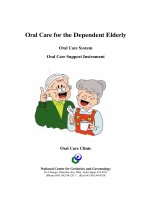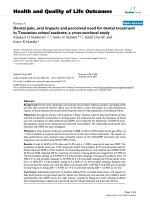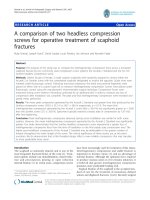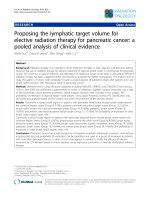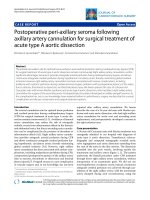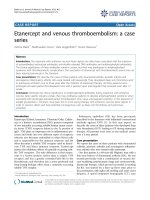Oral rivaroxaban for the treatment of symptomatic venous thromboembolism (a pooled analysis of the EINSTEIN DVT
Bạn đang xem bản rút gọn của tài liệu. Xem và tải ngay bản đầy đủ của tài liệu tại đây (249.53 KB, 22 trang )
Oral Rivaroxaban for the Treatment of
Symptomatic Venous Thromboembolism:
A Pooled Analysis of the EINSTEIN DVT
and EINSTEIN PE Studies
Anthonie WA Lensing
on behalf of the EINSTEIN Investigators
Bayer symposium - Da Nang, 13 October
Venous thromboembolism
1-2 new cases per 1000 per year
If no or inadequate anticoagulant treatment is given
recurrent thrombotic complications in 20-30%
Heparin/vitamin K antagonist (VKA)
VKA has a slow onset of action; heparin is needed for the first
week of treatment
VKA has an unpredictable anticoagulant effect, requiring
– frequent INRs and dose adjustments
Heparin/VKA recurrent VTE rate: ~ 3% at 6 mo
Rivaroxaban
Specific, direct factor Xa inhibitor
High oral bioavailability
Rapid onset of action
Half-life: 7–11 hours
Only 1/3 renally cleared
Small change in exposure with varying
bodyweight
Wide therapeutic window
Absorption limited if > 50 mg
Rivaroxaban
Can Rivaroxaban be given in a fixed
dose without the requirement for
monitoring and replace heparin and VKA
treatment in DVT/PE patients?
EINSTEIN DVT and EINSTEIN PE studies
Randomized, open-label, event-driven, non-inferiority studies of
identical design with a priori specified combined analyses
Primary efficacy outcome: recurrent VTE
Safety outcome: major bleeding
1. N Engl J Med 2010;363:2499 2. N Engl J Med 2012;366:1287–97
15 mg bid
DVT without
PE
1
N=3449
N=8282
Rivaroxaban
Day 1 Day 21
Enoxaparin bid for at least 5 days +
VKA, INR 2.0–3.0
PE with or
without DVT
2
N=4833
Predefined treatment period of 3, 6, or 12 months
20 mg od
30-day post-study
treatment period
Rivaroxaban
R
EINSTEIN DVT/PE:
primary efficacy outcome
Number of patients at risk
Rivaroxaban 4150 4018 3969 3924 3604 3579 3283 1237 1163 1148 1102 1034 938
Enoxaparin/VKA 4131 3932 3876 3826 3523 3504 3236 1215 1149 1109 1071 1019 939
0.5
3.0
2.5
2.0
1.5
1.0
0.0
Rivaroxaban
N=4150
Enoxaparin/VKA
N=4131
0 30 60 90 120 150 180 210 240 270 300 330 360
Time to event (days)
Cumulative event rate (%)
Rivaroxaban
n/N (%)
Enoxaparin/VKA
n/N (%)
HR (95% CI)
86/4150
(2.1)
95/4131
(2.3)
0.89 (0.66–1.19)
EINSTEIN DVT/PE:
major bleeding
Number of patients at risk
Rivaroxaban 4130 3921 3862 3611 3479 3433 2074 1135 1095 1025 969 947 499
Enoxaparin/VKA 4116 3868 3784 3525 3394 3348 1835 1109 1065 990 950 916 409
0.5
3.0
2.5
2.0
1.5
1.0
0.0
Rivaroxaban
N=4130
Enoxaparin/VKA
N=4116
0 30 60 90 120 150 180 210 240 270 300 330 360
Time to event (days)
Cumulative event rate (%)
Rivaroxaban
n/N (%)
Enoxaparin/VKA
n/N (%)
HR (95% CI)
p-value
40/4130
(1.0)
72/4116
(1.7)
0.54 (0.37–0.79)
p=0.002
Outcome
Rivaroxaban
(N=4130)
Enoxaparin/VKA
(N=4116)
HR (95% CI)
p-value
n % n %
Major bleeding* 40 1.0 72 1.7
0.54 (0.37–0.79)
p=0.002
Fatal 3 <0.1 8 0.2
Retroperitoneal 0 0 1 <0.1
Intracranial 2 <0.1 4 <0.1
Gastrointestinal/thorax 1 <0.1 3 <0.1
In a critical site 10 0.2 29 0.7
Retroperitoneal
1
<0.1 8 0.2
Intracranial
3
<0.1 10 0.2
Pericardial
0
0 2 <0.1
Other
6
0.1 7 0.2
Fall in hemoglobin ≥2 g/dl
and/or transfusions ≥2 units
27
0.7 37 0.9
Gastrointestinal
15
0.4 26 0.6
EINSTEIN DVT/PE:
types of major bleeding
*Some patients had >1 event
Einstein DVT/PE:
Clinical presentation of major bleeding
Major
bleeding
Rivaroxaban n=45
VKA n=79
Category 1
Controllable
18 (40.0%)
17 (21.5%)
Category 2
Requires
measures to
control, not serious
19 (42.2%)
34 (43.0%)
Category 3
Serious bleeding
7 (15.6%)
26 (32.9%)
Category 4
Fatal
1 (2.2%)
2 (2.5%)
Category 3+4 rivaroxaban vs VKA: odds ratio 0.39, 95% CI: 0.16-0.96; p=0.04)
Einstein DVT/PE - Major bleeding and
use of prohemostatic measures
Rivaroxaban
n=45
Enox/VKA
n=79
Vitamin K
1 30
FFP
4 11
Prothrombin
complex
2 9
rFVIIa
1 0
Outcome
Rivaroxaban Enoxaparin/VKA
HR (95% CI)
n/N % n/N %
Recurrent VTE
Non-fragile
65/3359 1.9 65/3349 1.9
0.98 (0.70–1.38)
Fragile 21/791 2.7 30/782 3.8 0.68 (0.39–1.18)
Major bleeding
Non-fragile
30/3342
0.9 37/3337 1.1 0.80 (0.49–1.29)
Fragile
10/788 1.3 35/779 4.5
0.27 (0.13–0.54)
EINSTEIN DVT/PE:
outcomes in fragile patients*
*Age >75 years, CrCl <50 ml/min, or body weight ≤50 kg
EINSTEIN DVT/PE:
Major bleeding and kidney function
0.8
1.4
0.9
1.0
3.0
4.0
0
2
4
6
8
10
12
14
>80
50−80
<50
Major bleeding (%)
Creatinine clearance (ml/min)
Rivaroxaban
Enoxaparin/VKA
p
trend
=0.92
p
trend
=0.01
Rivaroxaban Enoxaparin/VKA
n/N % n/N %
Limited
≤25% of vasculature of
a single lobe,
popliteal vein only
11/814 1.4 19/826 2.3
Intermediate
47/1941 2.4 50/1942 2.6
Extensive
multiple lobes and >25% of
entire pulmonary vasculature;
involving common femoral/
iliac vein
28/1218 2.3 25/1190
2.1
EINSTEIN DVT/PE:
Clot size and recurrent VTE
EINSTEIN PE:
Repeat CT scan at 3 weeks in 264 patients
Rivaroxaban
N=135
Enoxaparin/VKA
N=129
Complete resolution
59 (44%)
57 (44%)
Partial resolution
61 (45%)
58 (45%)
No change
15 (11%)
12 (9%)
Deteriorated
0
0
Van Es, et al. JTH, 11: 679–85
Venous thromboembolism and cancer
Long-term LMWH is recommended
LMWH is often not used based on medical,
economic and quality of life considerations
LMWH/VKA is often prescribed in practice
In EINSTEIN DVT/PE patients with cancer were not
excluded
Classification of DVT/PE patients with
cancer
Patients with cancer were classified as:
Active cancer at baseline (diagnosis or treatment < 6
months or recurrent or metastatic cancer)
Active cancer during the study (a new diagnosis of
cancer)
A history of cancer (all other)
EINSTEIN DVT/PE:
Analysis populations
Active cancer
at baseline
(n=462)
Active cancer
during study
(n=193)
History of
cancer
(n=469)
No known
cancer
(n=7157)
8281 patients randomized
EINSTEIN DVT/PE:
Outcomes
No known cancer
Rivaroxaban
Enoxaparin/VKA
HR (95% CI)
Recurrent VTE,
n (%) 65/3563 (1.8) 70/3594 (1.9)
0.93 (0.66–1.30)
Major bleeding, n (%)
31/3546 (0.9) 53/3582 (1.5)
0.58 (0.37–0.91)
Mortality, n (%)
33/3563 (0.9) 42/3594(1.2)
0.77 (0.49–1.22)
EINSTEIN DVT/PE:
Outcomes
History of cancer
Rivaroxaban
Enoxaparin/VKA
HR (95% CI)
Recurrent VTE,
n (%)
5/233 (2.1) 5/236 (2.1) 0.98 (0.28–3.43)
Major bleeding, n (%)
1/231 (0.4) 4/236 (1.7) 0.23 (0.03–2.06)
Mortality, n (%)
5/233 (2.1) 4/236 (1.7) 1.12 (0.30–4.22)
EINSTEIN DVT/PE:
Outcomes
Active cancer*
Rivaroxaban
Enoxaparin/VKA
HR (95% CI)
Recurrent VTE,
n (%)
16/354 (4.5) 20/301 (6.6) 0.67 (0.35–1.30)
Major bleeding, n (%)
8/353 (2.3) 15/298 (5.0) 0.42 (0.18–0.99)
Mortality, n (%)
58/354 (16.4) 53/301 (17.6) 0.93 (0.64–1.35)
*At baseline or diagnosed during the study
EINSTEIN DVT/PE in cancer:
Major bleeding and kidney function
2.4
2.2
2.1
2.7
5.0
13.0
0
2
4
6
8
10
12
14
>80
50−80
<50
Major bleeding (%)
Creatinine clearance (ml/min)
Rivaroxaban
Enoxaparin/VKA
p
trend
=0.92
p
trend
=0.01
EINSTEIN DVT/PE:
conclusions
In patients with acute symptomatic DVT and/or
PE, rivaroxaban showed:
Non-inferiority versus enoxaparin/VKA for efficacy
– Including cancer patients
Approximately 50% risk reduction for major bleeding
– Including cancer patients
Consistent efficacy and safety results irrespective of
age, body weight, gender, renal function, severity of
DVT/PE, and treatment of first/recurrent VTE
Single-drug approach: no LMWH needed

